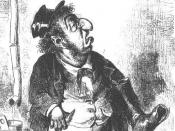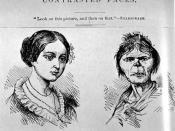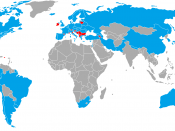Stereotypes in Gender Identity By Joe D. Ayala CENTRAL AZ COLLEGE "Okay Tommy it's time for playtime," says Tommy's father Richard.
"I want to play with sister's kitchen," exclaims Tommy.
"No, that's for girls Tommy," "But, I want to cook daddy," says Tommy.
"No, Tommy cooking is for girls," "I'm not a girl daddy, I'm a boy," "Of course you are." Just because Tommy wants to cook doesn't mean he is a female. From the day we are born we are socialized into our gender. The doctors and nurses wrap us in a pink or blue blanket. We are supposed to expect that a baby wrapped in pink is a girl and a baby wrapped in blue is a boy. This, like many, is a stereotype that a certain color or the fact that we like to cook judges our gender. No one can predict how we will behave or grow solely on the basis of our gender, strengths, weaknesses, or stereotypes.
Despite our differences, male and females have similar capabilities, behaviors, and potential no matter what gender they are. Our gender identity-the awareness of being male or female- grows overtime and develops from a variety of influences, most notably stereotypes that are taught from our parents, teachers, the media, and our peers.
Gender stereotypes are passed along like a set of rules or norms of what makes a girl "girly" or what makes a man "macho". These stereotypes promotes false ideas that males and females have different and predictable behavior and feelings based on their gender. Stereotypes limit the expectations that males and females come to have for themselves and make it difficult to find their identity. Some stereotypes we use in America and elsewhere are: -Females are more attractive.
-Football is too violent for women.
-Females are more emotional.
-Females are more nurturing.
-Cooking and cleaning is for females.
-Males are more successful and ambitious.
-Some males throw like females.
-Males are more rational.
-Males are stronger.
These set limitations keep our society from expanding. What if we wanted more well-rounded citizens? What about more well-rounded children? If more stereotypes were removed we would give people opportunities to develop new skills. "Boys who engage in stereotypical 'girl' activities develop nurturing skills and refine their motor coordination, which can later help with such skills as handwriting. Similarly, by playing with blocks, girls gain experience and confidence in their math and science skills" (Kekelis).
Obviously males and females are somewhat different creatures in general. The truth of the matter, however, is that they are not really as different as most perceive them to be. Of course men and women have some biological differences, but it's really their experiences in life that mold who they are. Males and females are taught different appropriate behaviors for their gender at early ages and that's where stereotypes become most effective.
One of the first effective groups to use stereotypes is our parents. They are the ones who begin the process of socialization and fitting us for our identity. Parents usually start to teach stereotypes through daily activities. Some ways they teach these stereotypes are: -The way they dress their children.
-The way their children's room is decorated.
-They toys and educational tools given to the child.
-The parents attitudes, language, and behaviors.
These all contribute to your future identity and what and who you view yourself as.
Stereotypes are also taught in the classroom and experienced by peers of the same age, usually unconsciously. Studies have shown that teachers generally give more one-on-one attention to male students, while giving females very little feedback (Basow 114). Additionally, they reinforce stereotypes through phrases such as "good girl" or "good boys don't do that", leading a child to believe that his or her behavior will always be judged upon the basis of his or her gender (Burn). These stereotypes lead us to deny our natural talents because we are not concordant with what is appropriate or in this case stereotypical.
Within the classroom we also have our peers, who in two main ways help us to experience stereotypes; name calling, and jokes. To an adolescent, it is traumatic to be seen as going against gender norms. Boys often tease each other with comments about their lack of strength because boys are supposed to be strong, and weakness is considered "girly." Especially when in large groups, the boys team up together to compare their strength and show off their masculinity (Duncan). The worst threat for these boys is to be called "gay". Unfortunately, that is the name which boys most often use in teasing one another (Duncan).
On the other hand, girls are teased for being aggressive, independent, or showing any other masculine trait. Appearance is very important when we are young, so making fun of the way a girl looks is common. Sexuality is also an important issue in youth, so teasing a girl about her sexual reputation is a harsh blow to her identity, regardless if it is fact or fiction. "At this stage, sexual rumors do run rampant" (Duncan). Consequences run high when stereotypes damage our ego and self esteem leaving some young people depressed and in what can be an identity crisis asking themselves who they really are.
As children, adolescents, and as adults we read and watch on television these harsh gender stereotypes. Women are portrayed in the household or in very stereotypically female occupations like secretary work or being a waitress always cleaning, cooking , or pleasing her husband, while men are seen as independent breadwinners bringing home the money. In addition, both books and television include less female characters than male characters overall (Burn). Television also conveys strong sexual attitudes and sexual gender stereotypes, most often showing women as sex objects for men.
When an attitude or behavior is looked upon with disapproval, the initial reaction is to simply to act in the socially approved ways of everyone else to avoid those negative consequences. Going by what is expected generally saves an individual the time to think about how to react. If he or she knows that things can be simpler by conforming, then that is most likely what will be done (Burn). Stereotypes play out through impression management, whereby an individual acts a certain way in order to appear acceptable to someone else (Basow 115) It seems as though people are willing to give up their individuality in order to fit in and it effects the future process of finding your identity.
It may be surprising that gender stereotypes have such a huge impact on our gender identity. Stereotypes begin to form at an extremely early age and are reinforced through parents, teachers, and the media, they effect us our whole lives. Stereotypes come out in parents, teachers, the media, and our peers. The strict gender criteria that we develop can lead to great difficulty when it comes to our identity leaving us to wonder how equal can males and females be.





